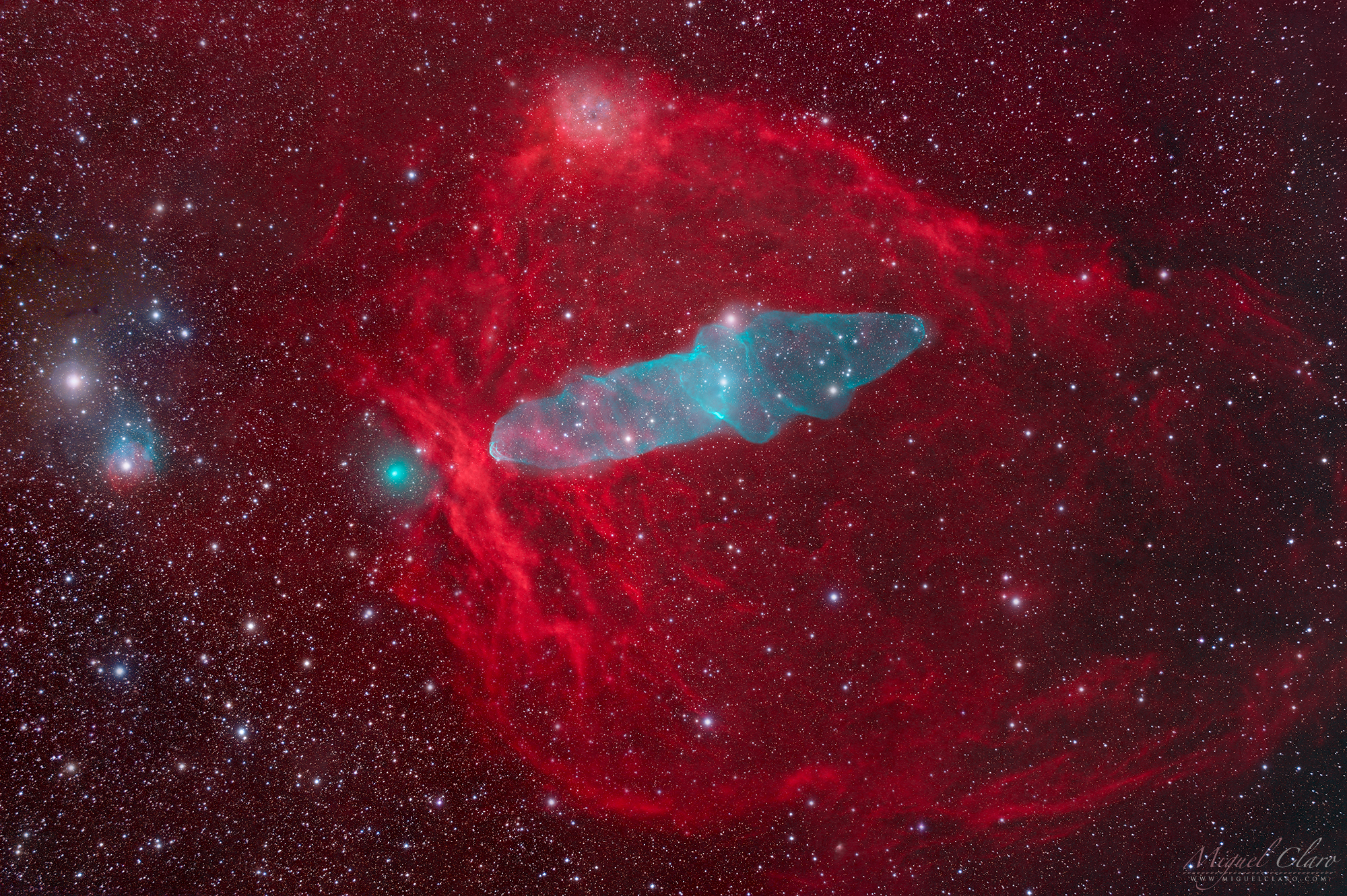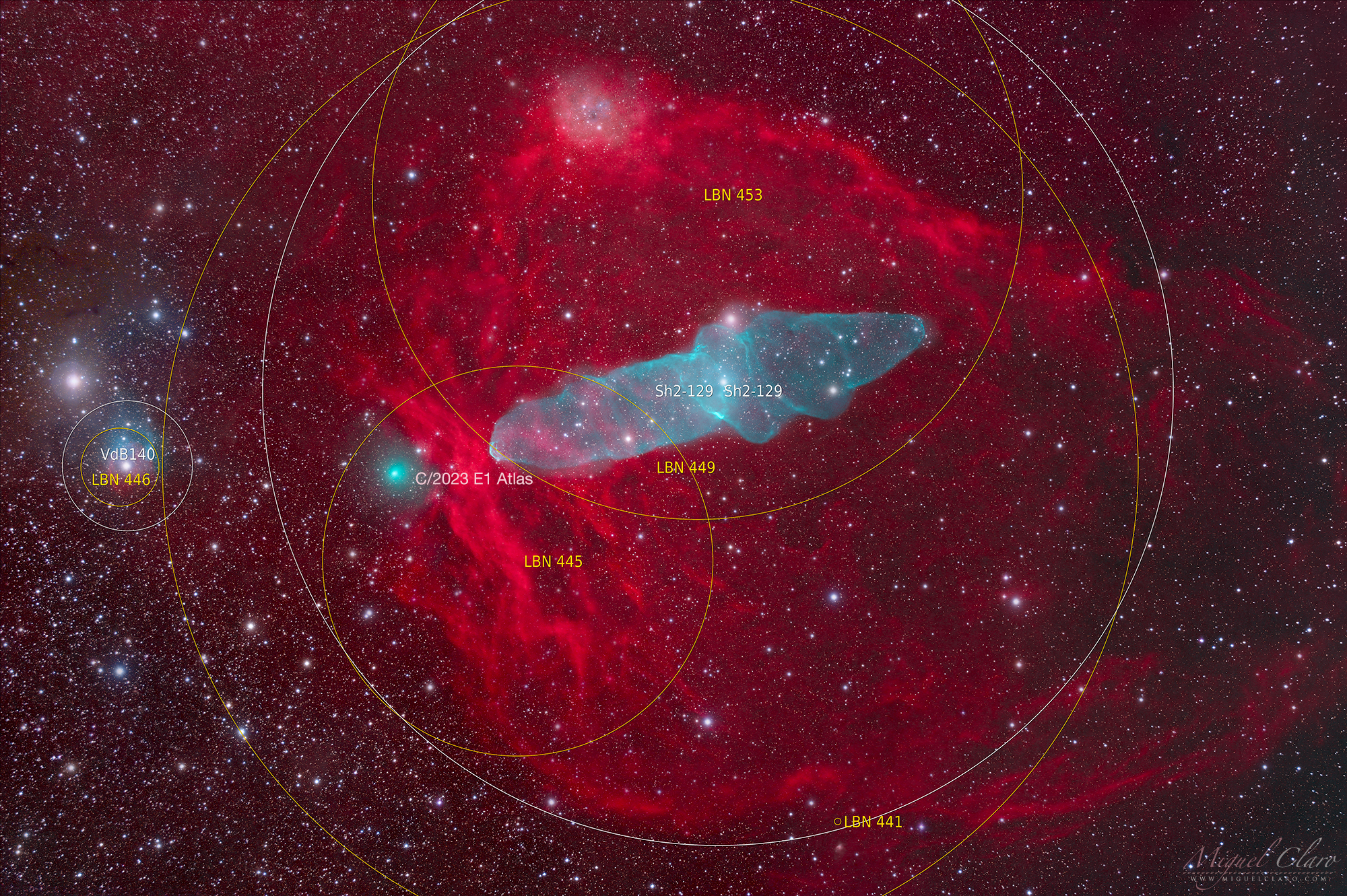Astrophotographer captures Comet C/2023 E1 Atlas in rare encounter with Flying Bat and Squid Nebula
The detailed deep-sky image captured by astrophotographer Miguel Claro shows the dramatic scene unfolding at different wavelengths.

Miguel Claro is a professional photographer, author and science communicator based in Lisbon, Portugal, who creates spectacular images of the night sky. As a European Southern Observatory Photo Ambassador and member of The World At Night and the official astrophotographer of the Dark Sky Alqueva Reserve, he specializes in astronomical "Skyscapes" that connect both Earth and the night sky.
This striking deep-sky image details a cosmic cacophony of nebulas, stars and a periodic comet with an orbital period of 85 years. The rare encounter was captured in exquisite detail by astrophotographer Miguel Claro.
A deep-sky portrait captured in different wavelengths between Ha, OIII and RGB light, features a large reddish cloud of glowing hydrogen gas from the Sh2-129, known as the Flying Bat nebula. The nebula, with a physical diameter of 271 light-years, seems to have embedded a blueish giant Squid Nebula which spans across the center 50 light-years long.
Discovered in 2011 by French astrophotographer Nicolas Outters and located in the constellation Cepheus, the very faint bipolar shape of this planetary nebula (stars like our sun transform themselves into white dwarfs by casting off their outer gaseous) is distinguished here by the blue-green emission from doubly ionized oxygen atoms (atoms of oxygen that have lost two electrons).
Although an extra greenish diffuse ball is visible close to the edge of the Flying Bat's reddish wings, it’s not a new type of fancy nebula, but a rare encounter with a solar system visitant, the lonely, faint Comet C/2023 E1 Atlas, shinning with a dimmer 14.7 magnitude.
Comet C/2023 E1 Atlas orbits the sun every 85 years at an average distance of 19 AU (an astronomical unit (AU) is exactly 149,597,870,700 meters (92,955,807 miles or 149,597,871 kilometers), according to the International Astronomical Union (IAU). This is roughly the average distance between Earth and the sun.)

Among the 11 nights between July and August that I spent shooting the Flying Bat nebula to accumulate a total exposure time of 39.5 hours, I was very lucky to capture Comet C/2023 E1 Atlas on Aug. 5, 2023, around 7 p.m. ET (2300 GMT) using the Anit-Halo PRO Dual-Band 3nm from Player One. Because I captured Ha and OIII at the same time, it allowed for the green coma of the comet to become visible in my filtered light for being emitting in the same wavelength where OIII emission lies in the G and B channels. If it was only Ha, I would have missed it because it was totally invisible in this narrowband red channel.
Get the Space.com Newsletter
Breaking space news, the latest updates on rocket launches, skywatching events and more!
to the left edge, are lying nebulas VdB 140 and LDN 446. The image was captured from Dark Sky Reserve Alqueva Observatory, Cumeada, in Portugal, with a Poseidon-C Pro Camera.
If you would like this type of images and videos but wish to see more "behind the scenes", just follow my stories on Instagram, you can easily find me at Miguel Claro Astrophotography @miguel_claro. More technical details related to equipment used on my website
Fine art prints

I hope you enjoy this photo as much as I do, and if you want to support my work as an independent artist, you can buy this image as a print for a piece of art or a wall decoration for your own home! Explore different sizing options and different print types below or contact me if you need further assistance. I'm planning to create a future limited edition Print Drop which will be available on my Print gallery. Meanwhile, you can sign up for my newsletter to get early access.
Join our Space Forums to keep talking space on the latest missions, night sky and more! And if you have a news tip, correction or comment, let us know at: community@space.com.









